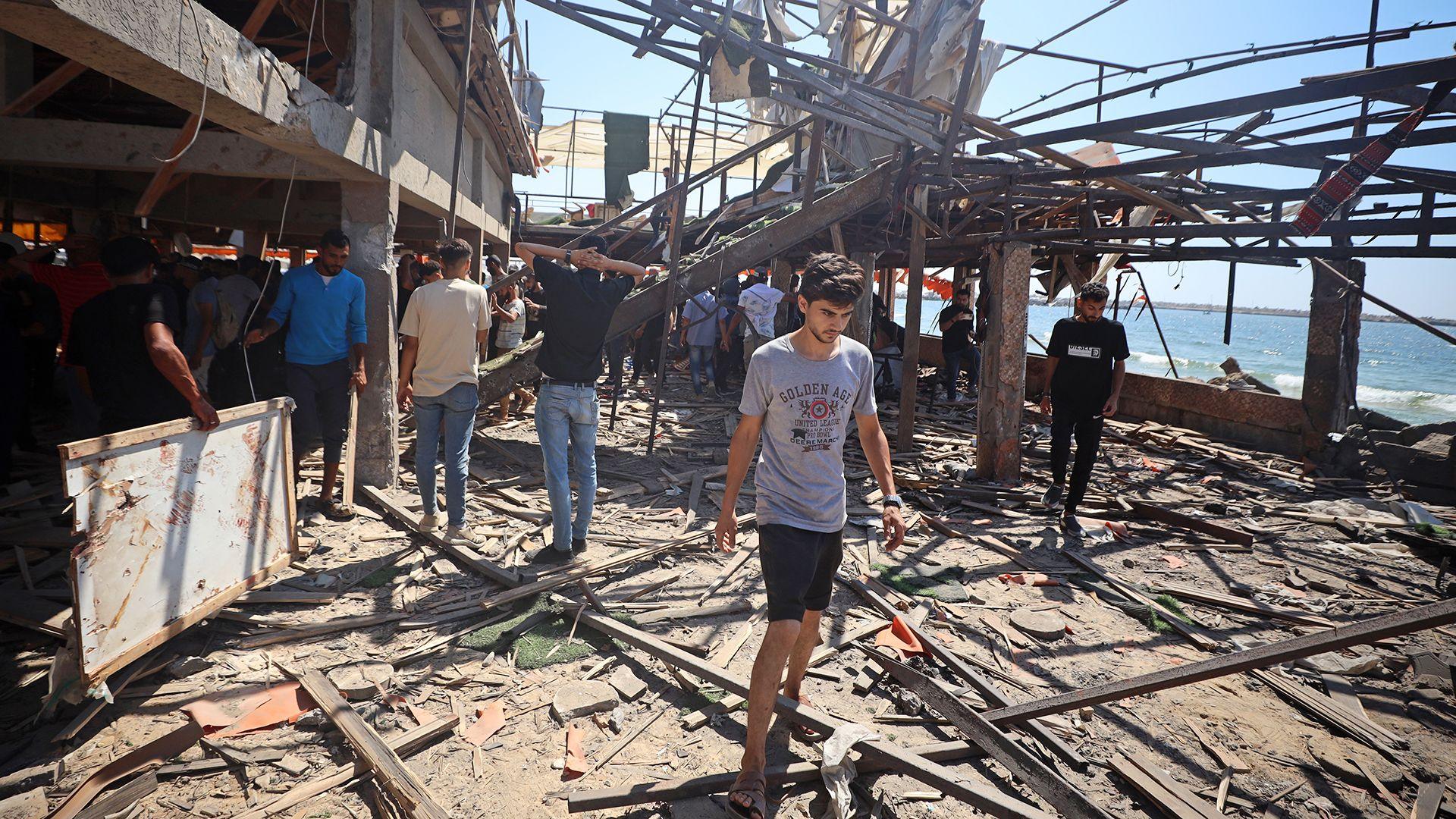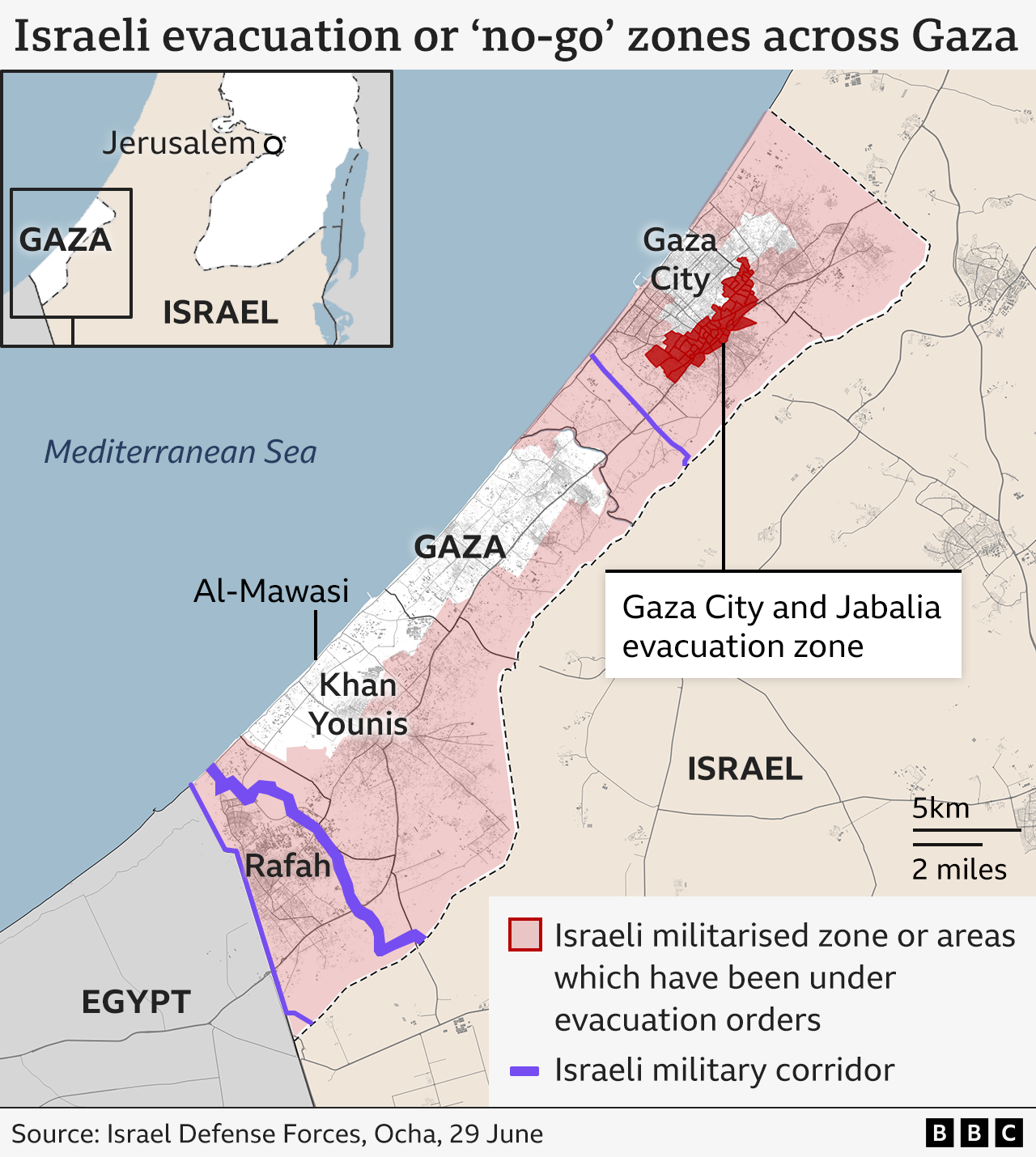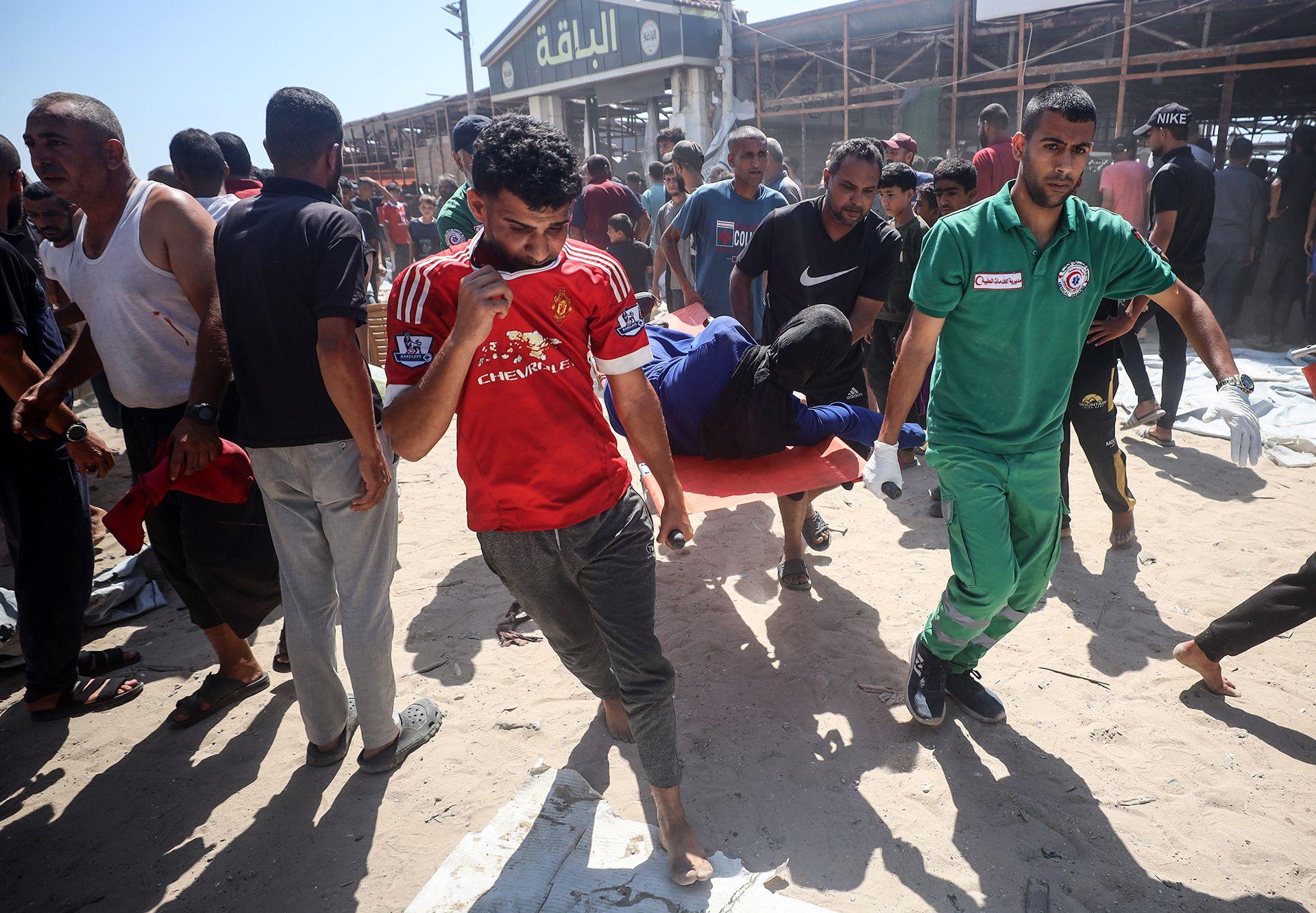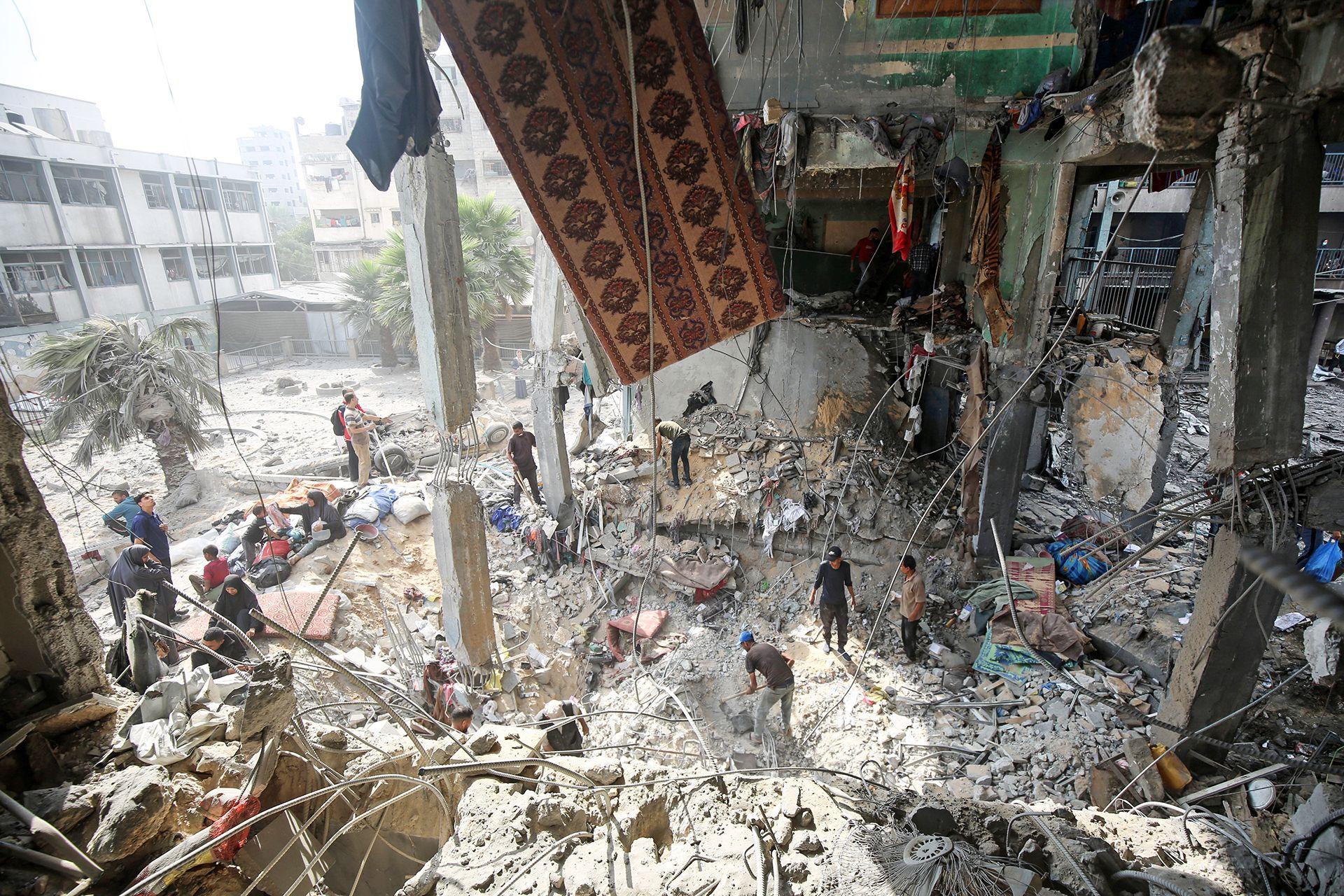Israeli strike on Gaza seafront cafe kills at least 20 Palestinians, witnesses and rescuers say

At least 20 people were reported killed at Al-Baqa Cafeteria on Monday
- Published
At least 20 Palestinians were killed in an Israeli air strike that hit a popular seafront cafe frequently used by activists, journalists, and local residents in western Gaza City on Monday, according to medics and eyewitnesses.
Rescue teams evacuated 20 bodies and dozens wounded from Al-Baqa Cafeteria, an outdoor venue which consisted of tents along the beach, a spokesperson for Gaza's Hamas-run Civil Defence told the BBC.
He added that emergency crews were still searching through a deep crater left by the explosion.
The Israeli military later said it struck "several Hamas terrorists" in northern Gaza and that it was reviewing the incident.
"I was on my way to the café to use the internet just a few meters away when a massive explosion hit," said Aziz Al-Afifi, a cameraman with a local production company, told the BBC.
"I ran to the scene. My colleagues were there, people I meet every day. The scene was horrific - bodies, blood, screaming everywhere."
Videos posted by activists on social media appeared to show the moment a missile, reportedly fired from an Israeli warplane, struck the area. Footage captured the aftermath of the attack, with bodies scattered across the ground.
Al-Baqa Cafeteria had become a well-known space for journalists, activists, and remote workers, offering internet access, seating, and workspace along Gaza's Mediterranean coast.
The Israeli military said in a statement that the strike targeted Hamas operatives, but it did not identify them.
"Prior to the strike, steps were taken to mitigate the risk of harming civilians using aerial surveillance," it added. "The incident is under review."
The attack came after Israel carried out a wave of air strikes across the Gaza Strip overnight, triggering the mass displacement of hundreds of Palestinian families, witnesses said.
Rescue teams recovered the bodies of five people, while dozens of injured civilians were evacuated to Al-Ahli Hospital in Gaza City, according to local reports.
The bombardment follows one of the largest evacuation orders issued since the war resumed in March.

It comes amid increasing pressure on Israeli Prime Minister Benjamin Netanyahu to refocus efforts to reach a ceasefire agreement.
On Saturday, US President Donald Trump said on social media that Netanyahu was working on negotiating a deal with Hamas "right now". That came days after a senior Hamas official said mediators had intensified their efforts to broker a new ceasefire and hostage release deal in Gaza, but that negotiations with Israel remain stalled.
A two-month ceasefire collapsed in March when Israel launched fresh strikes on Gaza. The ceasefire deal - which started on 19 January - was meant to have three stages, but did not make it past the first stage.
Israel followed this with a total blockade on humanitarian aid deliveries to Gaza, which it partially eased after 11 weeks following pressure from US allies and warnings of starvation from global experts.
The partial easing saw the creation of the controversial US- and Israeli-backed aid group, the Gaza Humanitarian Foundation (GHF). Since GHF took over distribution operations, there have been almost daily incidents of killings and injuries of Palestinians seeking aid.
Eyewitnesses and medics have blamed Israel, though Israel has said it has only fired warning shots towards people it considered a threat.

Rescue workers rushed to help those injured in the attack on the beachside cafe
Residents in Gaza City said dozens of Israeli air raids targeted densely populated eastern neighbourhoods, including Shujaiya, Tuffah, and Zeitoun.
Videos posted by activists on social media captured scenes of chaos and explosions illuminating the night sky, followed by flames and thick plumes of smoke rising above the skyline.
One of the strikes reportedly hit a school in Zeitoun that had been sheltering displaced families.
"Explosions never stopped... it felt like earthquakes," Salah, 60, from Gaza City told Reuters news agency.
"In the news we hear a ceasefire is near, on the ground we see death and we hear explosions," the father of five added.
The five fatalities reportedly occurred in a strike at the Al Shati camp, to the west of Gaza City.
The Israel Defense Forces (IDF) had earlier ordered residents to leave large parts of northern Gaza, in anticipation of the attacks. Most of those displaced overnight moved westwards within Gaza City rather than to the southern region as instructed by the IDF.

Elsewhere in Gaza City, the Al-Falah school in the Zeitoun neighbourhood was hit by Israeli airstrikes on Monday
"We had no choice but to leave everything behind," said Abeer Talba, a mother of seven who fled Zeitoun with her family.
"We got phone calls recordings in Arabic telling us we were in a combat zone and must evacuate immediately.
"This is the seventh time we've been forced to flee," she added. "We're in the streets again, no food, no water. My children are starving. Death feels kinder than this."
Amid the growing humanitarian crisis, fears are mounting that the evacuation orders and sustained air strikes are part of a broader Israeli plan to expand its ground offensive deeper into Gaza.
But there is also speculation in Israeli media that some generals are close to concluding that military operations in Gaza are near to being achieved.
That is also the view of many former army leaders who fear that the descent of the Gaza campaign into more attritional, guerilla-style warfare would lead to more deaths – of hostages, civilians and soldiers.
The Israeli prime minister's next moves are being closely watched. While Benjamin Netanyahu's instincts have always been to continue the war and defeat Hamas, he is coming under increasing pressure at home and abroad to pursue a new ceasefire agreement.
The Israeli military launched its bombardment of Gaza in response to the attack, in which about 1,200 people were killed and 251 others were taken hostage.
More than 56,000 people have been killed in Gaza since then, according to the territory's Hamas-run health ministry.
Additional reporting by Hafsa Khalil

